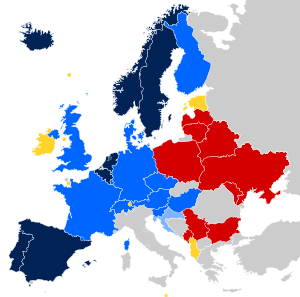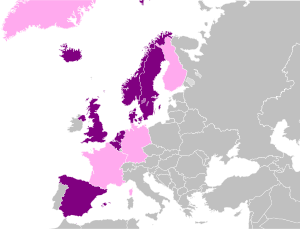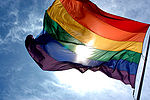LGBT rights in Europe

| Part of a series on | ||||||||
| Lesbian, gay, bisexual and transgender (LGBT) rights |
||||||||
|---|---|---|---|---|---|---|---|---|
|
||||||||
| Laws around the world Recognition of relationships Same-sex marriage LGBT adoption Military service Immigration issues Violence against
LGBT people Legal aspects of
LGBT rights organizationstranssexualism Opposition |
||||||||
|
||||||||
Lesbian, gay, bisexual, transgender (LGBT) rights are widely diverse in Europe per country. Seven out of the ten countries that have legalised same-sex marriage are situated in Europe; a further fourteen European countries have legalised civil unions or other forms of recognition for same-sex couples. Despite the historic widespread persecution of lesbians and gay men from the late Roman Empire until the late 20th century – including the oppression of homosexuals during the Holocaust – gay people enjoy far greater acceptance in Europe than on any other continent.
Contents |
History
Although same-sex relationships were quite common in ancient Greece, Rome and pagan Celtic societies, after Christianity became the official religion of the Roman Empire, severe laws against homosexual behavior appeared. An edict by the Emperor Theodosius I in 390 condemned all "passive" homosexual men to death by public burning. This was followed by the Corpus Juris Civilis of Justinian I in 529, which prescribed public castration and execution for all who committed homosexual acts, both active and passive partners alike. Justinian's law code then served as the basis for most European countries' laws against homosexuals for the next 1400 years. Homosexual behavior, called sodomy, was considered a capital crime, and thousands of homosexual men were executed across Europe during waves of persecution in these centuries. Lesbians were less often singled out for punishment, but they also suffered persecution and execution from time to time.
Since the foundation of Poland in 966, Polish law has never defined homosexuality as a crime.[1] Forty years after Poland lost its independence in 1795, the sodomy laws of Russia, Prussia, and Austria came into force in the occupied Polish lands. Poland regained its independence in 1918 and abandoned the laws of the occupying powers.[2][3][4] In 1932, Poland codified the equal age of consent for homosexuals and heterosexuals at 15.[5]
During the French Revolution, the French National Assembly rewrote the criminal code in 1791, omitting all reference to homosexuality. During the Napoleonic wars, homosexuality was decriminalised in territories coming under French control, such as the Netherlands and many of the pre-unification German states, however in Germany this ended with the unification of the country under the Prussian Kaiser, as Prussia had long punished homosexuality harshly. On 6 August 1942, the Vichy government made homosexual relations with anyone under twenty-one illegal as part of its conservative agenda. Most Vichy legislation was repealed after the war– but the anti-gay Vichy law remained on the books for four decades until it was finally repealed in August 1982 when the age of consent (15) was again made the same for heterosexual as well as homosexual partners.
Nevertheless, gay men and lesbians continued to live closeted lives, since moral and social disapproval by heterosexual society remained strong in France and across Europe for another two centuries, until the modern gay rights movement began in 1969.
Various countries under dictatorships in the 20th century were very anti-homosexual, such as in Nazi Germany, and in Spain under Francisco Franco's regime. In contrast, after Poland regained independence after World War I, it went on in 1932 to become the first country in 20th century Europe to decriminalise homosexual activity, followed by Denmark in 1933, Iceland in 1940, Switzerland in 1942 and Sweden in 1944.
In 1979, a number of people in Sweden called in sick with a case of being homosexual, in protest of homosexuality being classified as an illness. This was followed by an activist occupation of the main office of the National Board of Health and Welfare. Within a few months, Sweden became the first country in the world to remove homosexuality as an illness.[6]. In 1989, Denmark was the first country in Europe, and the world, to introduce registered partnerships for same-sex couples. In 2001 a next step was made, when the Netherlands opened civil marriage for same-sex couples, which made it the first country in the world to do so. Since then, six other European states followed (Belgium in 2003, Spain in 2005, Norway and Sweden in 2009 and Portugal and Iceland in 2010).
On 22 October 2009, the assembly of the Church of Sweden, voted strongly in favour of giving its blessing to homosexual couples,[7] including the use of the term marriage, ("matrimony"). The new law was introduced on November 1, 2009 and is the first case in the world.
Recent developments

In 2010, Portugal and Iceland became the sixth and seventh European countries to adopt same-sex marriage legislation. There is also a strong possibility politically in 2010 that same-sex marriage will become legal in 2 other European countries, Slovenia and Luxembourg. Finland also seems to be on its way to approve gender-neutral marriage law, as four out of the five largest political parties of Finland have taken the issue on their political agenda.[8][9]
The Oireachtas (parliament) of Ireland has approved the Civil Partnership and Certain Rights and Obligations of Cohabitants Bill 2009 in July 2010[10]. The two UK Crown territories of Isle of Man and Jersey are considering civil partnership laws in 2010.[11][12]. Liechtenstein is expected to legalize registered partnership in 2010.[13].
Six European countries ban gays from military service: Belarus, Cyprus, Latvia, Serbia, Greece and Turkey. All other European countries allow LGBT people to openly serve in the armed forces. As of July 2010, Greece and Gibraltar are the only two jurisdictions in Europe that have a higher unequal age of consent for gay men. All other jurisdictions in Europe have an equal age of consent for all individuals.
Public opinion around Europe
In a 2002 Pew Global Attitudes Project surveyed by the Pew Research Center, showed majorities in every Western European nation said homosexuality should be accepted by society, while most Russians, Poles and Ukrainians disagreed.[14] In 2006 a recent Eurobarometer poll surveying up to 30,000 people from each European Union countries, showed split opinion around the 27 member states on the issue of same sex marriage. The majority of support came from the Netherlands (82%), Sweden (71%), Denmark (69%), Belgium (62%), Luxembourg (58%), Spain (56%), Germany (52%) and Czech Republic (52%). All other countries within the EU had below 50% support; with Romania (11%), Latvia (12%), Cyprus (14%), Bulgaria (15%), Greece (15%), Poland (17%), Lithuania (17%) Hungary (18%) and Malta (18%) at the other end of the list.[15] Same sex adoption had majority support from only two countries: Netherlands at 69% and Sweden at 51% and the least support from Poland and Malta on 7% respectively.[15]
A more recent survey carried out in October 2008 by The Observer affirmed that the majority of Britons – 55% – support gay marriage.[16] Other polls show that the majority of the Irish public support civil unions and gay adoption, 51% and 50%, respectively.[17] France has support for same sex marriage at 62%,[18] and Russians at 14%.[19] Italy has support for the 'Civil Partnership Law' between gays at 45% with 47% opposed.[20] In 2009 58.9% of Italians supported civil unions, while 40.4 supported same-sex marriage.[21]
According to pollster Gallup Europe: women, younger generations, and the highly educated are more likely to support same-sex marriage and adoption rights for gay people.[22]
Legislation by country or territory

Northern Europe
| LGBT rights in: | Same-sex sexual activity | Recognition of same-sex relationships | Same-sex marriage | Same-sex adoption | Allows gays to serve openly in military? | Anti-discrimination (sexual orientation) | Laws concerning gender identity/expression |
|---|---|---|---|---|---|---|---|
+ UN decl. sign. |
|||||||
+ UN decl. sign. |
|||||||
+ UN decl. sign. |
|||||||
+UN decl. sign via Denmark. |
|||||||
+ UN decl. sign. |
N/A | ||||||
+ UN decl. sign. |
|||||||
+ UN decl. sign. |
|||||||
+ UN decl. sign. |
|||||||
+ UN decl. sign. |
|||||||
+ UN decl. sign. |
|||||||
+ UN decl. sign. |
Western Europe
| LGBT rights in: | Same-sex sexual activity | Recognition of same-sex relationships | Same-sex marriage | Same-sex adoption | Allows gays to serve openly in military? | Anti-discrimination (sexual orientation) | Laws concerning gender identity/expression |
|---|---|---|---|---|---|---|---|
+ UN decl. sign. |
|||||||
+ UN decl. sign. |
since 1999 |
||||||
+ UN decl. sign. |
|||||||
+ UN decl. sign. |
Central Europe
| LGBT rights in: | Same-sex sexual activity | Recognition of same-sex relationships | Same-sex marriage | Same-sex adoption | Allows gays to serve openly in military? | Anti-discrimination (sexual orientation) | Laws concerning gender identity/expression |
|---|---|---|---|---|---|---|---|
+ UN decl. sign. |
|||||||
+ UN decl. sign. |
|||||||
+ UN decl. sign. |
|||||||
totally legalized 1994 + UN decl. sign. |
|||||||
+ UN decl. sign. |
|||||||
+ UN decl. sign. |
N/A | ||||||
+ UN decl. sign. |
|||||||
+ UN decl. sign. |
|||||||
+ UN decl. sign. |
|||||||
+ UN decl. sign. |
Eastern Europe
| LGBT rights in: | Same-sex sexual activity | Recognition of same-sex relationships | Same-sex marriage | Same-sex adoption | Allows gays to serve openly in military? | Anti-discrimination (sexual orientation) | Laws concerning gender identity/expression |
|---|---|---|---|---|---|---|---|
+ UN decl. sign. |
|||||||
+ UN decl. sign. |
Unknown | ||||||
| Unknown | |||||||
+ UN decl. sign. |
|||||||
+ UN decl. sign. |
|||||||
+ UN decl. sign. |
Unknown | ||||||
+ UN decl. sign. |
|||||||
+ UN decl. sign. |
|||||||
+ UN decl. sign. |
|||||||
+ UN decl. sign. |
|||||||
Southern Europe
| LGBT rights in: | Same-sex sexual activity | Recognition of same-sex relationships | Same-sex marriage | Same-sex adoption | Allows gays to serve openly in military? | Anti-discrimination (sexual orientation) | Laws concerning gender identity/expression |
|---|---|---|---|---|---|---|---|
+ UN decl. sign. |
N/A | ||||||
+ UN decl. sign. |
|||||||
+ UN decl. sign. |
|||||||
+ UN decl. sign. |
|||||||
+ UN decl. sign. |
|||||||
+ UN decl. sign. |
|||||||
+ UN decl. sign. |
Unknown | ||||||
+ UN decl. sign. |
|||||||
| Unknown |
Partially recognised states
| LGBT rights in: | Same-sex sexual activity | Recognition of same-sex relationships | Same-sex marriage | Same-sex adoption | Allows gays to serve openly in military? | Anti-discrimination (sexual orientation) | Laws concerning gender identity/expression |
|---|---|---|---|---|---|---|---|
See also
- Recognition of same-sex unions in Europe
- LGBT rights in Africa
- LGBT rights in Oceania
- LGBT rights in the Americas
References
- ↑ http://www2.hu-berlin.de/sexology/IES/poland.html%20%20 http://www2.hu-berlin.de/sexology/IES/poland.html
- ↑ http://www.globalgayz.com/country/Poland/view/POL/a-brief-history-of-gay-poland
- ↑ http://www.glbtq.com/social-sciences/poland.html
- ↑ http://www2.hu-berlin.de/sexology/IES/poland.html#6
- ↑ http://books.google.com/books?id=2wd30pXJxpYC&pg=PA308&lpg=PA308&dq=1932+decriminalization+Poland&source=bl&ots=JIJAC5Uzhc&sig=1CrcxoPSk36b9SjyUJa2aTMfuXE&hl=en&ei=bUhETOSYAo2jOPiV8NsM&sa=X&oi=book_result&ct=result&resnum=7&ved=0CDIQ6AEwBg#v=onepage&q=1932%20decriminalization%20Poland&f=false
- ↑ Jag känner mig lite homosexuell idag | quistbergh.se
- ↑ Kyrkomötet öppnade för enkönade äktenskap – DN.se
- ↑ http://www.orastynkkynen.fi/?p=1721
- ↑ http://www.hs.fi/politiikka/artikkeli/Kokoomus+hyv%C3%A4ksyy+samaa+sukupuolta+olevien+avioliitot/1135257533241
- ↑ http://www.irishtimes.com/newspaper/breaking/2010/0708/breaking59.html
- ↑ http://www.pinknews.co.uk/2010/02/22/isle-of-man-to-consider-civil-partnerships-for-gay-couples/#
- ↑ http://www.pinknews.co.uk/2009/10/20/jersey-votes-to-allow-civil-partnerships/#
- ↑ http://www.queer.de/detail.php?article_id=11547#
- ↑ "Views of a Changing World 2003". The Pew Research Center. http://people-press.org/reports/display.php3?ReportID=185. Retrieved 29 January 2007.
- ↑ 15.0 15.1 "Eight EU Countries Back Same-Sex Marriage". Angus Reid Global Monitor : Polls & Research. http://www.angus-reid.com/polls/index.cfm/fuseaction/viewItem/itemID/14203. Retrieved 29 January 2006.
- ↑ "Sex uncovered poll: Homosexuality". The Guardian (London). 26 October 2008. http://www.guardian.co.uk/lifeandstyle/2008/oct/26/relationships. Retrieved 7 May 2010.
- ↑ "Irish Ponder Same-Sex Unions, Adoption". Angus Reid Global Monitor : Polls & Research. http://www.angus-reid.com/polls/index.cfm/fuseaction/viewItem/itemID/10964. Retrieved 29 January 2006.
- ↑ "French Back Same-Sex Marriage, Not Adoption". Angus Reid Global Monitor : Polls & Research. http://www.angus-reid.com/polls/index.cfm/fuseaction/viewItem/itemID/14058. Retrieved 29 January 2006.
- ↑ "Same-Sex Marriage Nixed By Russians". Angus Reid Global Monitor : Polls & Research. http://www.angus-reid.com/polls/index.cfm/fuseaction/viewItem/itemID/5986. Retrieved 29 January 2006.
- ↑ "Italians Divided Over Civil Partnership Law". Angus Reid Global Monitor : Polls & Research. http://www.angus-reid.com/polls/index.cfm/fuseaction/viewItem/itemID/14801. Retrieved 21 February 2007.
- ↑ Italiani più avanti della politica | Arcigay
- ↑ "Public opinion and same-sex unions (2003)". ILGA Europe. http://www.ilga-europe.org/europe/issues/marriage_and_partnership/public_opinion_and_same_sex_unions_2003. Retrieved 29 January 2006.
- ↑ "Consolidated Version of the Treaty on European Union". http://eur-lex.europa.eu/en/treaties/dat/12002M/pdf/12002M_EN.pdf. Retrieved 30 September 2010.
- ↑ 24.0 24.1 24.2 24.3 24.4 Ottosson, Daniel. "State-sponsored Homophobia: A world survey of laws prohibiting same sex activity between consenting adults". The International Lesbian, Gay, Bisexual, Trans and Intersex Association. http://old.ilga.org/Statehomophobia/ILGA_State_Sponsored_Homophobia_2010.pdf. Retrieved 30 September 2010.
- ↑ 25.00 25.01 25.02 25.03 25.04 25.05 25.06 25.07 25.08 25.09 25.10 25.11 25.12 25.13 25.14 25.15 25.16 25.17 Rainbow Europe Country Index
- ↑ "Gender-Neutral Marriage Law Possible by 2012". YLE. http://www.yle.fi/uutiset/news/2010/07/gender-neutral_marriage_law_possible_by_2012_1804013.html. Retrieved 2 July 2010.
- ↑ Criminal Justice and Immigration Act 2008 (c. 4)
- ↑ 28.0 28.1 "The Prevention of Discrimination (Enabling Provisions) (Bailiwick of Guernsey) Law, 2004". Guernsey Legal Resources. http://www.guernseylegalresources.gg/ccm/legal-resources/laws/discrimination/prevention-of-discrimination-enabling-provisions-bailiwick-of-guernsey-law-2004.en. Retrieved 30 September 2010.
- ↑ "Zakon o suzbijanju diskriminacije". Narodne-novine.nn.hr. 2008-07-21. http://narodne-novine.nn.hr/clanci/sluzbeni/340327.html. Retrieved 2010-09-30.
- ↑ The Constitution of the Republic of Poland
- ↑ Gay Adoptions Cause Rift as MPs Discuss Family Law Bill
- ↑ ZAKON O MATIČNEM REGISTRU
- ↑ "Albania protects LGBT people from discrimination". ILGA-Europe. 5 February 2010. http://www.ilga-europe.org/europe/news/latest_news/albania_protects_lgbt_people_from_discrimination. Retrieved 5 February 2010.
- ↑ Montenegro fulfils EU membership requirement and protects LGBT people from discrimination
- ↑ (Italian) 164/1982 Act
- ↑ Mudança de identidade já não precisa dos tribunais Dezanove.pt, 1 October 2010
- ↑ Discrimination will be banned, draft law says
External links
- Other laws on homosexuality in Europe
- FRA report "Homophobia and Discrimination on Grounds of Sexual Orientation in the EU Member States" Part I – Legal Analysis, 2008; Part II – Social Situation, 2009
- Gunther, Scott. "The Elastic Closet: A History of Homosexuality in France, 1942–present" Book about the history of homosexual movements in France (sample chapter available online). New York: Palgrave-Macmillan, 2009. ISBN 023022105X
- Article 18 of the Polish Constitution
- Article 38 of the Lithuanian Constitution
- Chronological overviews of the main legislative steps in the process of legal recognition of homosexuality in European countries. http://www.law.leidenuniv.nl/org/onderzoeksinstituut/medewerkers/waaldijkc.html
- LBGT Rights Lesbian Gay Bisexual and Transgender Rights before the European Court of Justice
- [3] Article: What has the EU done for LGBT Rights?
|
|||||||||||||||||||||||||||||||||||||||||||||||||||||||||||||||||||||||||||||||||||||||||||||||||||||||||||||||||||||||||||||||||||||||||||||||||||||||||||||||||||||||||||||||||||||||||||||||||||||||||
.svg.png)
